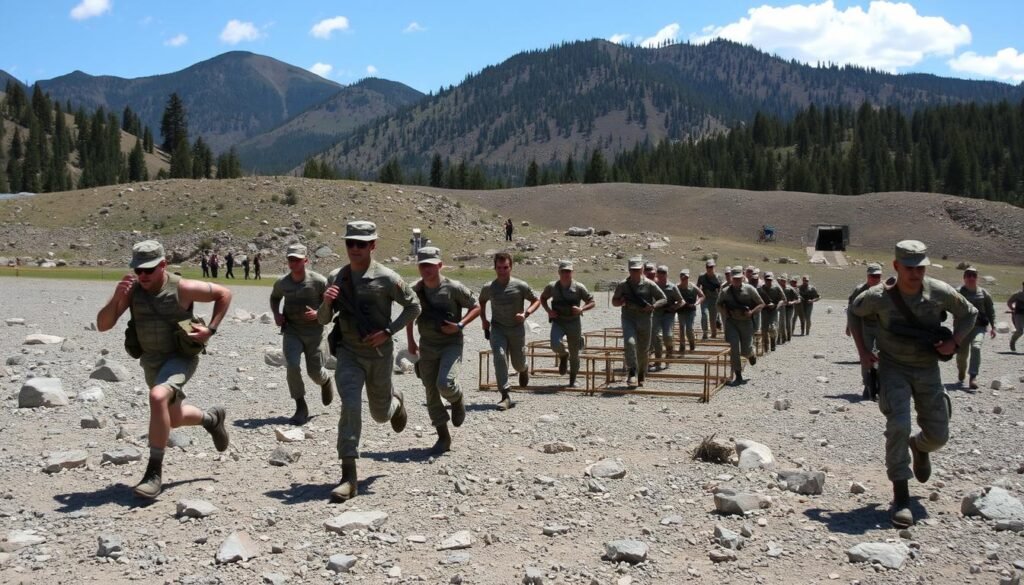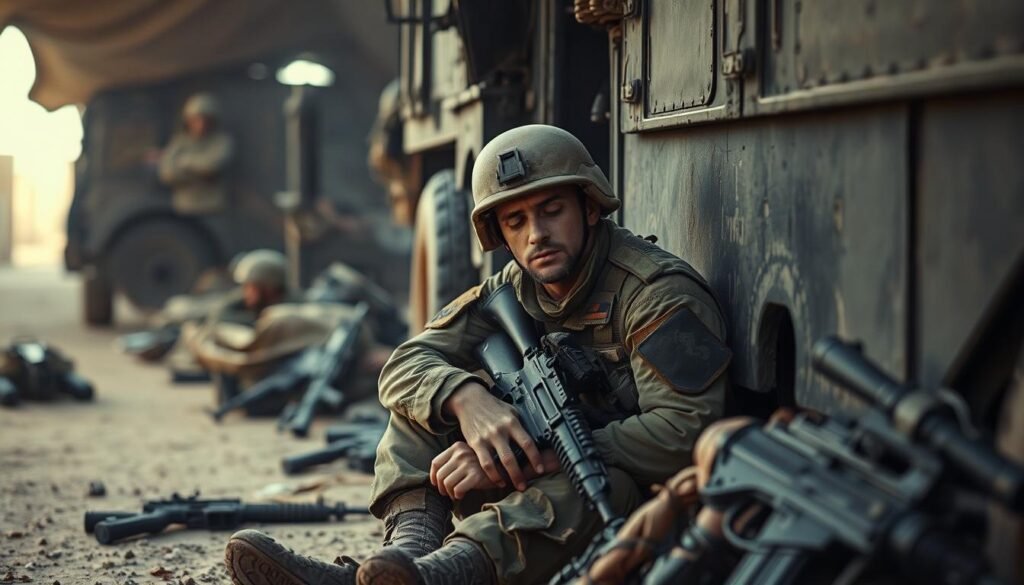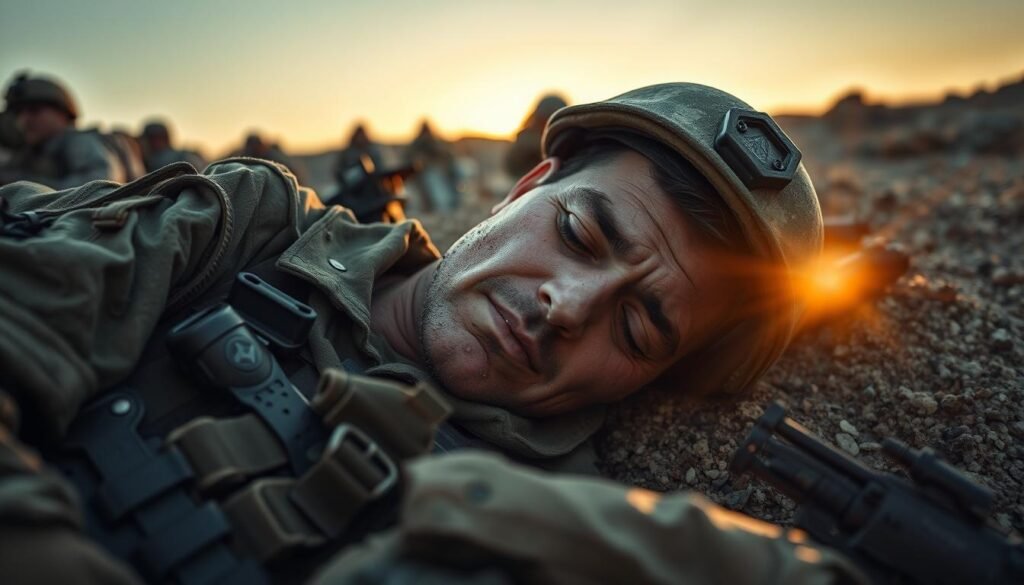Did you know that more than 62% of service members get less than 6 hours of sleep every night? This alarming fact shows a big problem that really affects how well the military works. Being exhausted is not just about feeling sleepy.
It can cause serious outcomes. For example, more accidents and worse performance when under stress. The Department of Defense (DOD) is worried about this. They know that not getting enough sleep can make things dangerous and less effective, especially in big operations like those at sea.
By understanding more about fatigue in military personnel, it’s vital to find ways to make service members’ performance better and keep them ready for action.
Key Takeaways
- Over 62% of soldiers get less than 6 hours of sleep per night.
- Fatigue can significantly impair cognitive function and decision-making abilities.
- Service members experiencing sleep deprivation are at a higher risk for accidents.
- Health metrics indicate a strong correlation between fatigue and physical readiness.
- Military leadership plays a crucial role in managing fatigue effectively.
Definition and significance of fatigue in military personnel
Fatigue is a big problem for military personnel. It affects their health and mind. Understanding fatigue is key to seeing its impact on their work. Military members often feel very tired. This can make them perform poorly and make bad decisions. Many find it hard to sleep enough.
Understanding fatigue in military contexts
There are two types of fatigue: physical and mental. Physical fatigue comes from hard activities in training. Mental fatigue is from being alert for long hours and stress. Over 929,000 soldiers were treated for neuropsychiatric diseases during World War II. Many had combat exhaustion. It’s vital to address fatigue to keep soldiers and units ready.
The importance of sleep for service members
Sleep helps soldiers stay at their best. Yet, many don’t get enough sleep. The Department of Defense says about two-thirds don’t sleep 7 hours a night. Not sleeping enough starts a cycle of fatigue. This can cause dangerous mistakes. Solving sleep problems can lessen bad fatigue effects. It helps with making better choices and successful missions. For more about fatigue and its diagnosis, check here.
Military fatigue effects on operational performance
Fatigue affects the effectiveness and safety of military members greatly. It slows down reflexes and weakens the brain’s functions. This makes studying their effects during operations very important.
Impact on reflexes and cognitive function
Soldiers face tough physical and mental tasks that make them very tired. Studies show that being tired slows reflexes, making decision-making slower in tense situations. Not sleeping enough is a big reason for this slowdown, even if the sleep loss is small.
Comparative analysis to intoxication levels
Studies compare being very tired to being drunk, showing both badly affect task performance. Operating planes or heavy machinery becomes much riskier when tired. A review of 20 studies found that watching heart rates can help monitor tiredness, especially in tough situations.
| Study Focus | Key Findings |
|---|---|
| Physiological Monitoring in Military Populations | Identified fatigue’s impact on operational performance through heart rate and activity measurements. |
| The Effects of Sleep Deprivation | Confirmed that even slight sleep loss disrupts cognitive function and increases accident risk. |
| Cognitive Performance Recovery | Established that peak performance occurs between 7:00 a.m. and 7:00 p.m. |
| Fatigue Management Strategies | Proposed organizational-level countermeasures including sleep management and alertness aids. |
| Environmental Stressors | Revealed that military operations introduce various stressors contributing to physical impairments and fatigue. |
Combat fatigue management strategies
It’s vital to manage combat fatigue well. This helps keep military personnel ready for action. Fatigue lowers performance by making decision-making harder and raising the chance of accidents. Knowing how the Department of Defense tackles this issue is key for our service members’ health.
Department of Defense measures
The Department of Defense has steps to manage combat fatigue. These steps are a big part of military life. Initiatives look for where fatigue comes from and stress how key sleep is. Troops getting just over six hours of sleep struggle to keep up. If they get less than five hours, their thinking can drop by 20 percent. Along with fatigue, combat stress can make things worse, causing bad tempers and low morale.
Programs on sleep habits and fatigue checks are making a difference. One example is a unit that changed when they exercise. They started sleeping over eight hours instead of five to six. Putting combat fatigue first helps avoid serious health problems and even death. For more details, check out this document.
Role of leadership in fatigue management
Leaders have a big part in making sure everyone values sleep. They need to show how to spot tiredness and make it okay to rest. In 2014, about 14 percent of soldiers had sleep issues. This shows we need to act early. Running campaigns on being aware of tiredness and coaching can lead to better habits.
Good leaders share how bad sleep can mean dangerous work. They say if you sleep five to six hours, it’s like being drunk. These facts show why teaching about tiredness is so important. When leaders talk about the need for good sleep and mental well-being, everyone benefits and is more ready for their duties.
| Measure | Description | Outcome |
|---|---|---|
| Fatigue Monitoring | Real-time assessment of soldier fatigue levels. | Reduced risk of accidents and enhanced performance. |
| Sleep Hygiene Education | Training sessions on best practices for quality sleep. | Increased average sleep duration and overall wellbeing. |
| Revised Training Schedules | Shifting physical training times to promote better sleep. | Enhanced physical performance and resilience against fatigue. |
Soldier endurance training and its significance
Endurance training is key to boosting soldiers’ physical skills and endurance. It helps soldiers face tough challenges during missions. By learning endurance, they handle tiredness better, which makes missions more successful.
Training regimens for fatigue resilience
To build stamina, the military uses specific training methods. These methods help soldiers deal with fatigue. Key parts of their training include:
- Endurance exercises that get harder over time.
- Strength training to boost physical abilities.
- Practice in realistic combat situations to test endurance.
Understanding stress, fatigue, and sleep’s importance is crucial for the military. Leaders must use this knowledge to plan. This careful planning helps soldiers succeed in their missions.
Real-world applications of endurance training
Military exercises show how important endurance training is. These exercises aim to:
- Make soldiers more physically prepared through regular training.
- Build mental strength in stressful situations.
- Find and manage endurance limits to reduce fatigue risks.
In the field, soldiers face many surprises. Their training in endurance helps them overcome obstacles. It shows their dedication and improves their performance even under stress.

Fatigue mitigation strategies
Fighting fatigue in the military needs a well-thought-out plan, guided by the Department of Defense. Putting into action ways to ease fatigue is vital. It ensures soldiers perform their best and stay safe. These efforts help create an environment where everyone knows the importance of health, even in tough times.
Guidance from the Department of Defense
The Defense Department sets rules to boost soldiers’ readiness and effectiveness. These include getting enough rest and managing time well. Key parts of the plan are:
- Scheduled breaks: Taking breaks often keeps soldiers from getting too tired and helps them recover.
- Education programs: Workshops teach soldiers how to deal with tiredness and understand its signs and dangers.
- Peer support systems: Talking openly about tiredness helps build a team that supports each other.
Awareness campaigns for recognizing fatigue
Campaigns to increase awareness about fatigue are crucial. They teach soldiers how to spot tiredness in themselves and others. Such efforts aim to:
- Individual recognition: Soldiers learn to notice when they’re feeling worn out.
- Peer observation: They’re also taught to see the signs of tiredness in their teammates.
- Promoting discussion: These campaigns encourage open talks about fatigue, leading to better prevention.
Sleep deprivation impact on troops
Sleep deprivation is a big problem for soldiers, especially during combat. Many don’t get enough rest, which is worrying. This lack of sleep affects their readiness and mental health.
Statistics on sleep patterns within the military
In Iraq and Afghanistan, U.S. Army members get only about 5.8 to 6.5 hours of sleep. Navy personnel in Afghanistan also struggle, sleeping just 5.9 hours nightly. They actually need closer to 6.8 hours. Military cadets suffer too, missing more than 3 hours of sleep daily. This impacts their abilities a lot.
Consequences of chronic sleep deprivation
Lack of sleep causes more than just tiredness. It leads to health issues and risky behaviors in the military. Special forces soldiers sleeping less than four hours face over 2.35 times more injuries. It also slows down reaction times and hurts performance.

Better sleep is key for our military’s health and readiness. The military needs to help soldiers sleep better. This will help them stay healthy and ready for action. Learn more about sleep performance and its effect on service.
Cognitive fatigue in military operations
Cognitive fatigue is a big challenge in military work. It deeply affects how well service members can do their jobs under pressure. As they face more demands, knowing how cognitive fatigue impacts decision-making is key to mission success.
Links between fatigue and decision-making
Studies show a clear link between cognitive fatigue and worse decision-making in the military. Sleep-deprived individuals can lose about 25 percent of their mental sharpness after one day without sleep. This problem grows with more sleep loss, dropping cognitive skills by 30 percent after one sleepless night and 60 percent after two. These declines can lead to bad choices and less effective operations. This is especially true for complex tasks like running command centers or flying planes.
Effects on situational awareness and mission success
Cognitive fatigue greatly affects situational awareness. It makes it hard for service members to spot threats and react quickly. This can lead to severe problems in operations if personnel go without sleep for three days. Also, the Army now has 300 percent more missions with less money and fewer people. This increases the risk of decision errors and mission failures.
To fight cognitive fatigue, military groups should improve cognitive resilience. They should use training that includes regular breaks and mental recovery methods. This could make better situational awareness and decision-making, which are vital for mission achievements. For deeper understanding on cognitive resilience in the military, check this detailed research here.
Physical fatigue in tactical environments
Physical fatigue is a big issue in tactical settings. It affects how ready and effective military operations can be. Soldiers often face tough conditions. These conditions make it hard for them to perform well and increase their chances of getting hurt. One example is a soldier carrying over 100 pounds of gear all day.
How it affects readiness and combat effectiveness
Physical fatigue significantly impacts operational readiness. Studies show that military training can cause a soldier’s performance to drop temporarily. For instance, a tired point man might not notice important signs ahead after walking less than 500 meters. This could lead to bad outcomes in ambush situations. A tired soldier is a risk to themselves and their team. This shows how everyone on the battlefield depends on each other.
Challenges of maintaining physical fitness under fatigue
It’s tough for service members to stay fit when they’re tired. Long training sessions can harm muscles and reduce strength. Strategies to fight these problems are crucial. Soldiers need good rest plans to help them get ready for their missions.
Research finds that hard exercises lower testosterone for up to 96 hours, making recovery hard. This makes it clear that having rest plans helps soldiers recover and stay ready for their duties.

| Parameter | Effect Size (SMD) | P-Value |
|---|---|---|
| Muscle Damage | -1.28 | 0.003 |
| Strength and Power Impairment | 0.91 | 0.008 |
| Testosterone Levels | 1.48 | 0.05 |
| Inflammation | -0.70 | 0.11 |
| Cortisol | -0.18 | 0.81 |
| Insulin-like Growth Factor 1 | 0.65 | 0.07 |
Mental fatigue in sustained missions
Military personnel face big challenges due to mental fatigue in long missions. Issues like anxiety, depression, and low morale can arise. It’s vital to understand these effects. This helps in creating strong support systems for mental toughness.
Psychological effects of extended operations
Mental tiredness hits service members hard during long missions. They deal with stress and big demands all the time. A study shows over 87% feel workplace stress. This can lead to burnout, harming how they think and feel.
About 0% to 49.7% feel very emotionally drained. This harms how well they can do their job. Other issues like anxiety and depression add to their challenges.
Strategies for mental resilience
To counter these tough effects, building mental strength is key. Some major ways to do this include:
- Stress management techniques: Mindfulness and building resilience help service members handle military stresses.
- Support systems: Open talks in units and mental health resources create a helpful setting.
- Cognitive training: Enhancing mental strength can better performance in stress-filled situations, studies show.
These strategies are crucial for service members’ mental health. They help them face the challenges of mental fatigue in long missions.
| Psychological Factor | Prevalence Rate | Impact on Performance |
|---|---|---|
| High Emotional Exhaustion | 0% – 49.7% (Median 19%) | Decreased cognitive performance and morale |
| High Depersonalization | 0% – 59.6% (Median 14%) | Increased feelings of detachment and cynicism |
| Low Personal Accomplishment | 0% – 60% (Median 6.4%) | Reduced satisfaction and effectiveness |
Conclusion
Military fatigue is a big issue that affects how well service members do their jobs. It includes physical, mental, and emotional tiredness. By looking at these types, the Three-Dimensional Work Fatigue Inventory (3D-WFI) helps us understand the problem. It shows that many in the military feel tired even when they’re not on duty.
To help service members do better, we need to focus on managing tiredness. This means making sure they sleep well, stay active, and are clear about their roles. Also, knowing how job demands lead to tiredness helps in making plans to keep them healthy and ready for action.
The military must keep working on ways to deal with tiredness as research improves. Things like better endurance training, making sleep a priority, and strengthening mental toughness are key. These steps will help service members face their challenging jobs head-on.